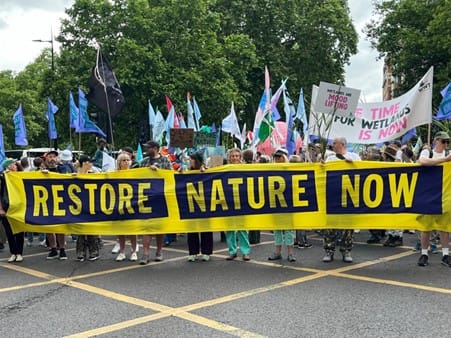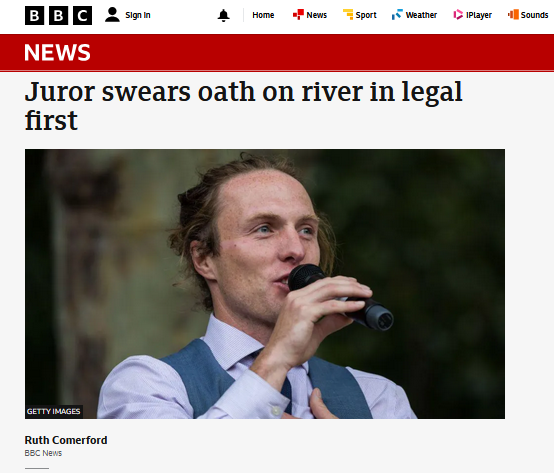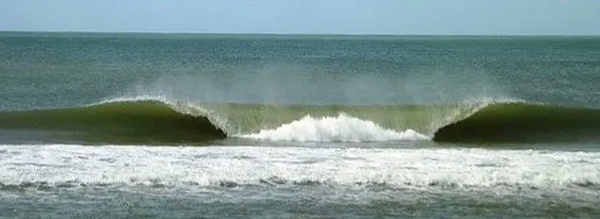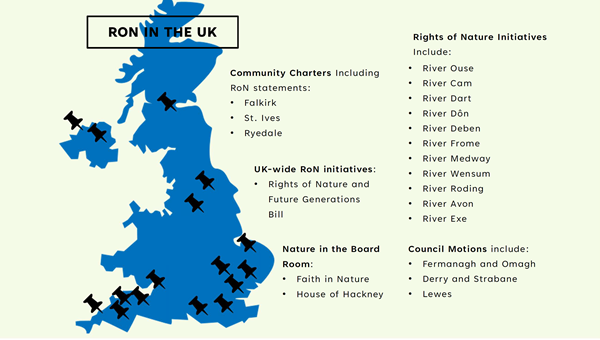Standing up for Rights of Nature - Election special

So far, the Green Party is the only party with Rights of Nature laws mentioned in their party manifesto. Our hope is that political candidates from other parties might also begin to support the idea that there is a need to change our whole legal system to restore and benefit Nature. Stopping the destruction of the natural world is vitally important, yet current proposals do not go far enough. Last weekend, on Saturday 22nd June, over 60,000 people marched in London to demand: Restore Nature Now.
If you would like to raise the idea of Rights of Nature with a political candidate, here are some questions you could ask at your local hustings, on social media, and in correspondence with them.
We call on all Nature defenders to start asking these important questions at political events in the run up to the election.
Rights of Nature in brief
1. What is ‘Rights of Nature’?
Currently, our legal system is only for humans and human organisations, and it functions primarily to benefit humans – and causes significant harm to non-humans and ecosystems while doing so.
Rights of Nature is the idea that various elements of nature should have legal rights – such as the right to ecological integrity, to maintain life cycles, to be free from pollution, and to restoration from damage – and the ability to act (via human representatives) in the legal system, known as legal personhood.
Our legal system must protect and benefit non-humans and vital ecosystems – both for its own sake and because we need to ensure a healthy environment for humans to live in.
2. Why don’t we just strengthen environmental law?
Rights of Nature takes a fundamentally different approach to environmental law:
- Environmental law has not worked. We have seen decline and destruction for many decades.
- Environmental law is often about managing nature and the environment for human benefit. Rights of Nature is about valuing and protecting nature for its own sake.
- Environmental law is usually based on particular targets or thresholds which are often trying to mitigate harm instead of avoid it – such as how often sewage can go into rivers. Rights of Nature instead focuses on ensuring that habitats and species have their life cycles protected and seeks to protect against serious harm.
Questions to ask candidates
1. Do you agree that we need Rights of Nature legislation to ensure that nature is properly protected?
We think that wholesale legal reform is necessary to reverse the current trends of ecological destruction, and that Rights of Nature is currently the best proposed model for this.
2. Do you agree that we need a radically different paradigm to environmental protection than we currently have? And that we should place ecological health and sustainability at the core of our legal and economic system?
This question focuses on the fact that existing approaches have failed, and that we need a radically different approach. So where a candidate may not want to comment much on the concept of ‘Rights of Nature’ that they might not know much about, this focuses on the issue itself.
3. [With reference to a local campaign] – do you agree with campaigners that we should give the River _____ legal rights so that it can defend itself in our legal system and be protected to good ecological health?
If there is a local conservation campaign in your area which is taking a Rights of Nature approach, then you can ask a question about whether the candidates think of a Rights of Nature approach in relation to that.




